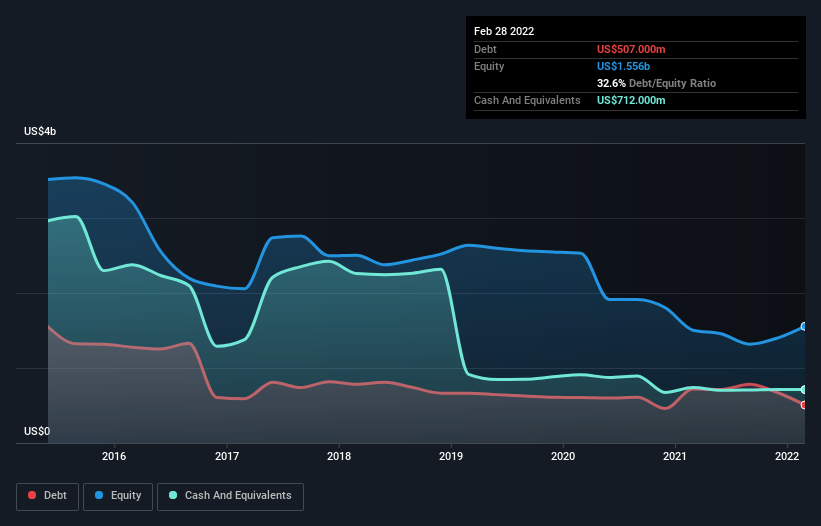The external fund manager backed by Berkshire Hathaway's Charlie Munger, Li Lu, makes no bones about it when he says 'The biggest investment risk is not the volatility of prices, but whether you will suffer a permanent loss of capital.' So it might be obvious that you need to consider debt, when you think about how risky any given stock is, because too much debt can sink a company. Importantly, BlackBerry Limited (TSE:BB) does carry debt. But is this debt a concern to shareholders?
What Risk Does Debt Bring?
Debt and other liabilities become risky for a business when it cannot easily fulfill those obligations, either with free cash flow or by raising capital at an attractive price. Part and parcel of capitalism is the process of 'creative destruction' where failed businesses are mercilessly liquidated by their bankers. However, a more usual (but still expensive) situation is where a company must dilute shareholders at a cheap share price simply to get debt under control. Of course, the upside of debt is that it often represents cheap capital, especially when it replaces dilution in a company with the ability to reinvest at high rates of return. When we examine debt levels, we first consider both cash and debt levels, together.
Check out our latest analysis for BlackBerry
What Is BlackBerry's Net Debt?
You can click the graphic below for the historical numbers, but it shows that BlackBerry had US$507.0m of debt in February 2022, down from US$720.0m, one year before. But it also has US$712.0m in cash to offset that, meaning it has US$205.0m net cash.

How Strong Is BlackBerry's Balance Sheet?
The latest balance sheet data shows that BlackBerry had liabilities of US$397.0m due within a year, and liabilities of US$614.0m falling due after that. Offsetting these obligations, it had cash of US$712.0m as well as receivables valued at US$172.0m due within 12 months. So it has liabilities totalling US$127.0m more than its cash and near-term receivables, combined.
Given BlackBerry has a market capitalization of US$3.29b, it's hard to believe these liabilities pose much threat. But there are sufficient liabilities that we would certainly recommend shareholders continue to monitor the balance sheet, going forward. Despite its noteworthy liabilities, BlackBerry boasts net cash, so it's fair to say it does not have a heavy debt load! There's no doubt that we learn most about debt from the balance sheet. But it is future earnings, more than anything, that will determine BlackBerry's ability to maintain a healthy balance sheet going forward. So if you're focused on the future you can check out this free report showing analyst profit forecasts.
In the last year BlackBerry had a loss before interest and tax, and actually shrunk its revenue by 20%, to US$718m. That's not what we would hope to see.
So How Risky Is BlackBerry?
Although BlackBerry had an earnings before interest and tax (EBIT) loss over the last twelve months, it made a statutory profit of US$12m. So taking that on face value, and considering the cash, we don't think its very risky in the near term. With revenue growth uninspiring, we'd really need to see some positive EBIT before mustering much enthusiasm for this business. There's no doubt that we learn most about debt from the balance sheet. But ultimately, every company can contain risks that exist outside of the balance sheet. To that end, you should learn about the 5 warning signs we've spotted with BlackBerry (including 1 which is concerning) .
At the end of the day, it's often better to focus on companies that are free from net debt. You can access our special list of such companies (all with a track record of profit growth). It's free.
Valuation is complex, but we're here to simplify it.
Discover if BlackBerry might be undervalued or overvalued with our detailed analysis, featuring fair value estimates, potential risks, dividends, insider trades, and its financial condition.
Access Free AnalysisHave feedback on this article? Concerned about the content? Get in touch with us directly. Alternatively, email editorial-team (at) simplywallst.com.
This article by Simply Wall St is general in nature. We provide commentary based on historical data and analyst forecasts only using an unbiased methodology and our articles are not intended to be financial advice. It does not constitute a recommendation to buy or sell any stock, and does not take account of your objectives, or your financial situation. We aim to bring you long-term focused analysis driven by fundamental data. Note that our analysis may not factor in the latest price-sensitive company announcements or qualitative material. Simply Wall St has no position in any stocks mentioned.
About TSX:BB
BlackBerry
Provides intelligent security software and services to enterprises and governments worldwide.
Excellent balance sheet with reasonable growth potential.
Similar Companies
Market Insights
Community Narratives


Recently Updated Narratives


Engineered for Stability. Positioned for Growth.


MINISO's fair value is projected at 26.69 with an anticipated PE ratio shift of 20x


Fiverr International will transform the freelance industry with AI-powered growth
Popular Narratives


MicroVision will explode future revenue by 380.37% with a vision towards success


NVDA: Expanding AI Demand Will Drive Major Data Center Investments Through 2026



